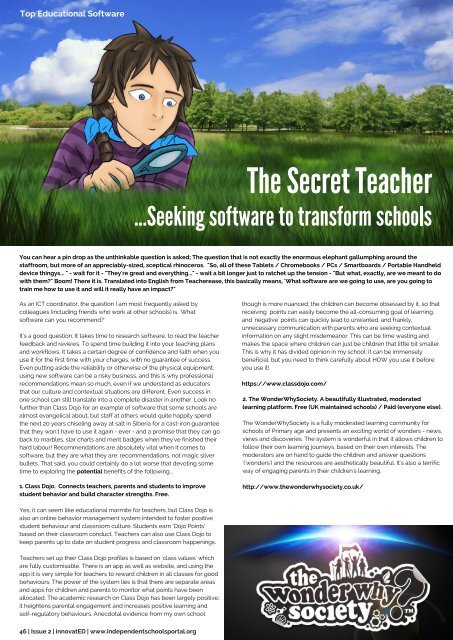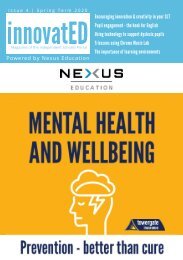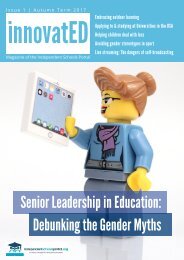innovatED - Issue 2
Create successful ePaper yourself
Turn your PDF publications into a flip-book with our unique Google optimized e-Paper software.
Top Educational Software<br />
The Secret Teacher<br />
...Seeking software to transform schools<br />
You can hear a pin drop as the unthinkable question is asked; The question that is not exactly the enormous elephant gallumphing around the<br />
staffroom, but more of an appreciably-sized, sceptical rhinoceros. "So, all of these Tablets / Chromebooks / PCs / Smartboards / Portable Handheld<br />
device thingys... " - wait for it - "They're great and everything..." - wait a bit longer just to ratchet up the tension - "But what, exactly, are we meant to do<br />
with them?" Boom! There it is. Translated into English from Teacherease, this basically means, 'What software are we going to use, are you going to<br />
train me how to use it and will it really have an impact?"<br />
As an ICT coordinator, the question I am most frequently asked by<br />
colleagues (including friends who work at other schools) is, 'What<br />
software can you recommend?'<br />
It's a good question. It takes time to research software, to read the teacher<br />
feedback and reviews. To spend time building it into your teaching plans<br />
and workflows. It takes a certain degree of confidence and faith when you<br />
use it for the first time with your charges, with no guarantee of success.<br />
Even putting aside the reliability or otherwise of the physical equipment,<br />
using new software can be a risky business, and this is why professional<br />
recommendations mean so much, even if we understand as educators<br />
that our culture and contextual situations are different. Even success in<br />
one school can still translate into a complete disaster in another. Look no<br />
further than Class Dojo for an example of software that some schools are<br />
almost evangelical about, but staff at others would quite happily spend<br />
the next 20 years chiseling away at salt in Siberia for a cast-iron guarantee<br />
that they won't have to use it again - ever - and a promise that they can go<br />
back to marbles, star charts and merit badges when they've finished their<br />
hard labour! Recommendations are absolutely vital when it comes to<br />
software, but they are what they are: recommendations, not magic silver<br />
bullets. That said, you could certainly do a lot worse that devoting some<br />
time to exploring the potential benefits of the following...<br />
1. Class Dojo. Connects teachers, parents and students to improve<br />
student behavior and build character strengths. Free.<br />
though is more nuanced; the children can become obsessed by it, so that<br />
receiving points can easily become the all-consuming goal of learning,<br />
and 'negative' points can quickly lead to unwanted, and frankly,<br />
unnecessary communication with parents who are seeking contextual<br />
information on any slight misdemeanor. This can be time wasting and<br />
makes the space where children can just be children that little bit smaller.<br />
This is why it has divided opinion in my school: it can be immensely<br />
beneficial, but you need to think carefully about HOW you use it before<br />
you use it!<br />
https://www.classdojo.com/<br />
2. The WonderWhySociety. A beautifully illustrated, moderated<br />
learning platform. Free (UK maintained schools) / Paid (everyone else).<br />
The WonderWhySociety is a fully moderated learning community for<br />
schools of Primary age and presents an exciting world of wonders - news,<br />
views and discoveries. The system is wonderful in that it allows children to<br />
follow their own learning journeys, based on their own interests. The<br />
moderators are on hand to guide the children and answer questions<br />
'('wonders') and the resources are aesthetically beautiful. It's also a terrific<br />
way of engaging parents in their children's learning.<br />
http://www.thewonderwhysociety.co.uk/<br />
Yes, it can seem like educational marmite for teachers, but Class Dojo is<br />
also an online behavior management system intended to foster positive<br />
student behaviour and classroom culture. Students earn ‘Dojo Points’<br />
based on their classroom conduct. Teachers can also use Class Dojo to<br />
keep parents up to date on student progress and classroom happenings.<br />
Teachers set up their Class Dojo profiles is based on 'class values' which<br />
are fully customisable. There is an app as well as website, and using the<br />
app it is very simple for teachers to reward children in all classes for good<br />
behaviours. The power of the system lies is that there are separate areas<br />
and apps for children and parents to monitor what points have been<br />
allocated. The academic research on Class Dojo has been largely positive::<br />
it heightens parental engagement and increases positive learning and<br />
self-regulatory behaviours. Anecdotal evidence from my own school<br />
46 | <strong>Issue</strong> 2 | <strong>innovatED</strong> | www.independentschoolsportal.org






